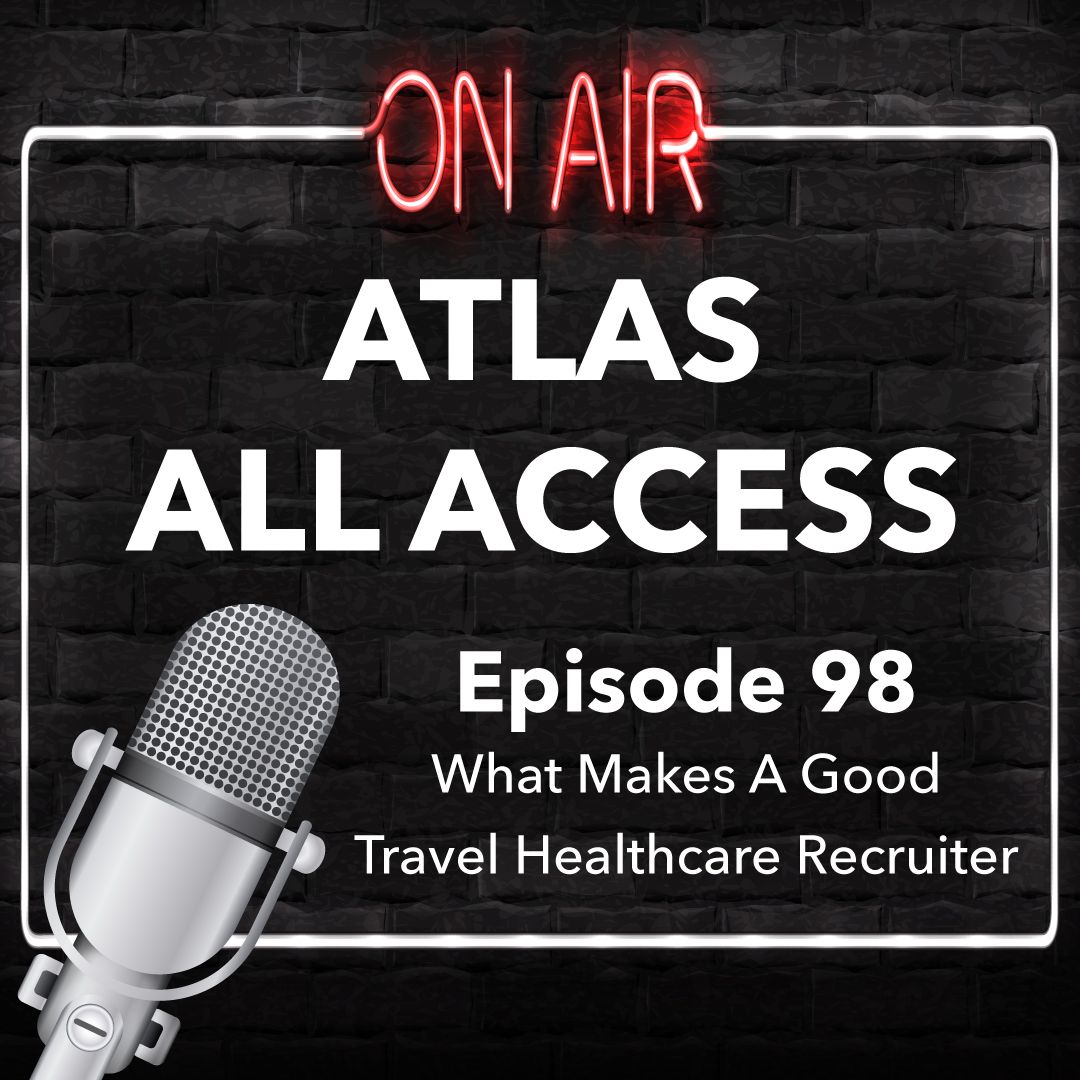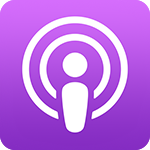
What are the qualities of a good Travel Healthcare Recruiter? - Pt 2 of 3 - Atlas All Access 98
12-20-2019
With all the changes in the travel healthcare industry, how do you ensure you find a good recruiter? What makes a great recruiter?
Check out part two in this three-part video series where we discuss the traits of a good travel healthcare recruiter.
Think Corey has the traits you are looking for in a recruiter? Get to know Corey: https://atlasmedstaff.com/atlas-team/corey-anderson/
Rich Smith: Part two of What it Takes to Be a Good Recruiter. On this episode, Corey Anderson joins us. We're going to go through numbers six through 10. Again, strictly mine, this is what I think it takes to be a good recruiter. We're going to get some feedback and reaction from Corey here, who's been doing this for a number of years. We'll see if these play into his every day recruiting life. Ready? Atlas All Access starts now. Okay. Welcome back.
Corey Anderson: Nice to be here.
Rich Smith: It seems like you were just here talking about the shoes.
Corey Anderson: Yeah, it hasn't been that long, a couple of weeks.
Rich Smith: Which is still ... I don't know where we're at with this, but-
Corey Anderson: Got to get our hands on them.
Rich Smith: As of recording time, you still can't get them.
Corey Anderson: Correct.
Rich Smith: Right? And we're recording this early in December, so you still can't get them. We'll see how this plays out.
Corey Anderson: We'll get them sometime.
Rich Smith: We will get them. Okay. So number six through 10 of traits of a great recruiter. Like I've said before, I said this on each one of the episodes so far, this is strictly my list. I cobbled this together from a number of different lists and a couple of videos that I watched and I thought, "Okay, you don't have to be all of these, but you have to at least understand what they are and embody most of them."
Corey Anderson: Cool. I'm going in blind because I have not seen these.
Rich Smith: I hope so. Yeah. Because I want to get just your fresh take on these. Okay. So number six, be coachable.
Corey Anderson: Yeah.
Rich Smith: I think our industry changes so much.
Corey Anderson: Constantly.
Rich Smith: Yes. So as you think back throughout your recruiting career so far, what does being coachable mean?
Corey Anderson: I mean, I think I'm about six years in, something like that and still it's weekly that I come across something that it's either been a really long time or something that somehow is still brand new to me. I reach out to some of the other even more senior people around here or even some of the newer people that may have come across it, but you've got to be flexible and you've got to be able to adapt because it's a fast changing industry for sure.
Rich Smith: And I wrote this down, I have little notes for each one of them. So being coachable to me is willing to learn, be an early adopter, understand that while these are the traits of a person that's coachable, not everything is going to work.
Corey Anderson: Correct.
Rich Smith: And even if you try something and it doesn't work, be able to move on from that.
Corey Anderson: Yep.
Rich Smith: Because I've seen a lot of recruiters get stuck before and because they think something, they believe something is going to work and they just keep hammering that and in the end it really doesn't.
Corey Anderson: It's no different anything else, learning from your mistakes.
Rich Smith: Yeah.
Corey Anderson: It happens.
Rich Smith: All right, number seven, be positive.
Corey Anderson: Got to be because this is an extremely up and down job. Lots of highs, lots of lows, riding those waves. Too high or too low will wreck you at times so you kind of got to stay positive.
Rich Smith: You and I talk, we talk a lot anyway.
Corey Anderson: Yep.
Rich Smith: I mean, this is one of those things I think you do a very good job at is especially when you'll lose somebody to ... you know it probably isn't the best choice for them maybe because you've worked with them for a while and as a recruiter you embody that, you kind of take that on. They make that choice anyway, but you stick with it. Right?
Corey Anderson: Yep.
Rich Smith: You stay with them. You're their recruiter no matter what and you stay positive through the thing because, and I've seen this happen a hundred times and I know you've had it happen to you three weeks in, they'll call you and say, "What did I do?"
Corey Anderson: Yep.
Rich Smith: Right? And you stay positive.
Corey Anderson: Yeah. It's their decision ultimately, their career. I'm going to be supportive regardless. It still happens, you lose people for a contract, but they come back hopefully.
Rich Smith: And bottom line is, you end up becoming friends with these folks anyway, so you stay in touch and just like you would support a friend in any other way you support these guys.
Corey Anderson: Yeah.
Rich Smith: All right. Number eight, be resourceful. And I think this goes to problem solving and that type of thing because as much as on number six you said, there's things that maybe, after doing this for six years, you've never seen or whatever, being resourceful and understanding maybe each situation differently goes kind of plays into that problem solving piece.
Corey Anderson: Correct.
Rich Smith: So give me an example maybe recently where it hasn't been it... maybe it didn't go as smoothly as you would have thought or maybe not as typical as you would have thought, but in the end it worked itself out.
Corey Anderson: Sure. I'm trying to think of an example. I don't know, sitting here on the spot, if I can come up with something super specific, but I can tell you that there's times often that I will go seek out you or another client manager, another recruiter, just due to a specific skill set a nurse might have or what they're looking for as far as traits in a hospital or locations or something. It's a team effort in here a lot and people come to me and ask me if I've got experience, I'll reach out to recruiters that I know they've had nurses at a certain place, "Hey, tell me about the onboarding here. We've heard there's an exam or something before the or when they get there that first day," and those kinds of things. So for sure, I use people around here all the time.
Rich Smith: When I think... one of the reasons why, as I was looking for volunteers for this and Jake, now yourself and then Braden next week have kind of embody each section... Each one of you embodies a number of these. And we saw it last week with Jake, there's a number of these in here that really embody who you are as a recruiter, next week we're really going to see it with Braden, the last three really, really embody who Braden is as a recruiter.
Corey Anderson: Sure. Cool.
Rich Smith: And honestly, the difference between the three of you is while you're still very successful, all three of you are very successful, you're very different and different in different ways.
Corey Anderson: Yep.
Rich Smith: I think the be resourceful part was the shoe idea.
Corey Anderson: Yep.
Rich Smith: You were the first one to see that and come up with, "Hey we got to do something with this." Right? That's thinking outside the box, being more resourceful, thinking, "Okay, how else can we... what can we do with this?" Because in the end, it became a pretty big thing.
Corey Anderson: Yeah. It's been fun. So I can't wait to see how it turns out honestly, so.
Rich Smith: Me too. So hopefully by the time this airs we have announced some winners. Yeah.
Corey Anderson: Hopefully we get them. Right.
Rich Smith: So, but I think that's part of being resourceful is using the tools that you have and then really kind of thinking outside of all of that to-
Corey Anderson: Absolutely. And luckily we're blessed, obviously here to have... I came to you with the shoe idea and it's like, "Yeah, let's run with it." So I don't know that every agency would do that, so it's your strength.
Rich Smith: Okay. So number nine, be passionate and this kind of plays in, we'll talk about it a lot next week because there's a couple of them in there that they really kind of embodied this. But if you don't love what you do, recruiting's tough.
Corey Anderson: It's tough. That kind of goes back to the staying positive thing. You've got to. And you'll find yourself, as a recruiter, you got to fight for your nurses sometimes in different circumstances, but if you're not 100% in, then you fighting for them isn't going to be real easy for you. You know what I'm saying?
Rich Smith: Absolutely.
Corey Anderson: So yeah, you got to be.
Rich Smith: And I know that there have been times, because you and I have had these conversations, and this isn't atypical at all where you really, really believe this is absolutely what's best for them.
Corey Anderson: Yeah.
Rich Smith: And sometimes what's best for them doesn't always make a ton of sense from a business standpoint maybe, right?
Corey Anderson: Right.
Rich Smith: But if you believe in that and you fight for it, I mean, that's being passionate as a recruiter.
Corey Anderson: For sure. For sure.
Rich Smith: And sometimes that means voices get raised, right? And that's sometimes that feelings get hurt and things like that.
Corey Anderson: Right.
Rich Smith: But in the end, if it's the right decision for the right reasons, it's the right thing to do.
Corey Anderson: For sure. No question.
Rich Smith: So, all right. So number 10 and this kind of goes back to number six, being coachable. Number 10 is ask questions, but I want to go at it from a different angle because this seems super easy, but it's not only you asking the questions here and as your role as a recruiter, but then you asking the questions on the phone and knowing what questions to ask or through text or through that type of thing.
Corey Anderson: Right.
Rich Smith: I think you're very good, looking at you as a recruiter, you're very good at asking those questions to make sure that you get your travelers in the right positions that will work best for them.
Corey Anderson: Sure. I think a lot of that comes from just experience for one, getting information up front, well, cut off any problems down the road or as many as possible, just nothing's ever super smooth usually.
Rich Smith: Right.
Corey Anderson: But you learn what to ask and what to find out early on so you don't fight battles once a nurse gets to a hospital or during onboarding or whatever it might be. So, and it's important, plus you get to know them by asking questions.
Rich Smith: Right. And sometimes it's less the question and more of the silence that follows the question, right. It's very hard because we all like to hear ourselves talk. I do. Right? I mean, it's in the end, a recruiter is a sales person to a certain extent, right? I mean, you have jobs that... there are parallels there.
Corey Anderson: Yep.
Rich Smith: You're not selling used cars or anything, but you understand where I'm going with this that it's the ability to ask the question and then shut up.
Corey Anderson: Yeah. Yeah. The best phone calls are when you ask a question and then I sit there for 10 minutes listening. That's usually when your connections are made and all that good information comes out, so for sure.
Rich Smith: Absolutely. Yeah. So again, these were these only... these were ones I came up with of traits of a great recruiter. So I think there's a lot of them in here that, like I said before, if you... you may not be all of them, but you at least have to know what they are.
Corey Anderson: Yeah. Everybody's different. Everybody's got their own style and things and it evolves constantly.
Rich Smith: Right.
Corey Anderson: So.
Rich Smith: Absolutely, yeah. If there's one constant in our world here at the office in Atlas every day, recruiting traveling healthcare professionals is... it always changes.
Corey Anderson: Oh, for sure.
Rich Smith: Everything. There's nothing...
Corey Anderson: There's always a surprise waiting for you.
Rich Smith: Yes.
Corey Anderson: Somewhere.
Rich Smith: Every day is different.
Corey Anderson: Yep, no question.
Rich Smith: In some way. Good and bad.
Corey Anderson: Yeah. Oh yeah, for sure.
Rich Smith: But being able to be coachable, being positive through it, staying resourceful, knowing where to go to get those answers, being passionate, loving what you do, even though sometimes it rubs people the wrong way.
Corey Anderson: Yep.
Rich Smith: I get it, but that gets you to where you need to be. And then asking the right questions and making sure that you're taking care of your people on the back end there.
Corey Anderson: Yep. Those are all great.
Rich Smith: Awesome. All right, well thank you so much for being here.
Corey Anderson: Thanks for having me.
Rich Smith: I appreciate it. You are getting so good on the camera.
Corey Anderson: Well, I'm only sweating a little bit.
Rich Smith: A lot of you don't know this, but when Corey started here, he didn't want to be on camera at all.
Corey Anderson: I still don't, I'm just trying to get outside the box a little bit and-
Rich Smith: I love it. All right. Thanks again man.
Corey Anderson: Yep.
Rich Smith: We'll see you next week.



